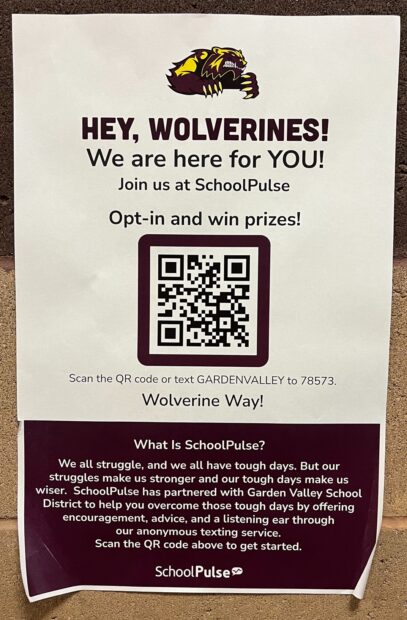GARDEN VALLEY — In response to a post-COVID mental health crisis, Idaho school districts from Boise to Garden Valley have recruited partners to improve student mental health services for students and their families.
“We can’t expect to have this monumental event and then go back to ‘normal.’ It doesn’t work like that. This is where the classroom has to change to become more adaptive,” said Garden Valley vice principal Michelle Ogle.
Tucked between the Payette River and mountain ranges, Garden Valley and its 500 residents and 286 students are isolated, which can exacerbate mental health issues.
“Mental health is high on the radar here in Garden Valley,” school district IT director Kevin Hennessey said. “Being a small, rural mountain town, there are lots of broken homes, substance abuse, juvenile arrests.”
Like hundreds of small U.S. timber towns, the loss of timber mills that began in the 1980s left many bereft and bored. When the pandemic magnified these issues, school officials knew that they had to get serious about helping students. Parents agreed.
A January 2023 survey of Garden Valley adult residents showed that 94.7% of participants believe that a program dedicated to providing mental health resources would benefit the student body and community. In response, Garden Valley instituted a number of potential solutions during the 2022-2023 school year.
First was a multi-tier system of support (MTSS) to better identify students in need. Led by Miranda Hennessey, MTSS broadened access to counseling services and helped identify academic and behavioral struggles.
“It’s 100 percent had an effect,” Hennessey said. “Miranda has a trusted bond with students and helped catch things that went under radar. We’ve definitely seen improvement.”
Next was a watchdog system installed on school computers. This flagged profanity and/or keyword searches for phrases like “suicide” and other warning signs. There is then an incident review and assessment then a second review to analyze if the search was assignment-related or of genuine concern.
Finally, Garden Valley brought mental health professionals to students via grant-funded telehealth software and School Pulse, an app-based counseling service. Not only did this meet students where they were (on their cell phones), services eliminated the challenge of face-to-face counseling access in a remote setting. Teachers were thankful for the lessened burden.

“Many teachers, while doing their best, struggle to deal with the complex issues their students present, leading to feelings of anxiety and hopelessness in our staff,” Hennessey stated in the grant application. Even when telehealth came on, logistics were still an issue for staff.
“We had kids on telehealth all over the place in the school building, wherever there was a space for it. Kids walking across the street to the district office…” Ogle said.
Castle Mountain Homes, a local architecture firm, stepped up with a solution. After donating summer construction, the resultant expanded student services center will include a designated room built with a lobby and private spaces for counseling sessions.
Ogle has been in charge of selecting soothing colors and welcoming furniture. When the school year begins, the mental health center will utilize booths every day on a schedule. Come September, there’s high hopes for an additional grant to provide even more robust telecommunications and connective capabilities.
Garden Valley is not alone in addressing student well-being.
The Boise School District is bringing private professionals into schools and offering whole family services in collaboration with a behavioral health and managed services company. And the State Department of Education is working with the Marsing, Glenn’s Ferry and Kimberly school districts to “embed sustainable mental and behavioral supports,” said the SDE’s Maggie Reynolds.
